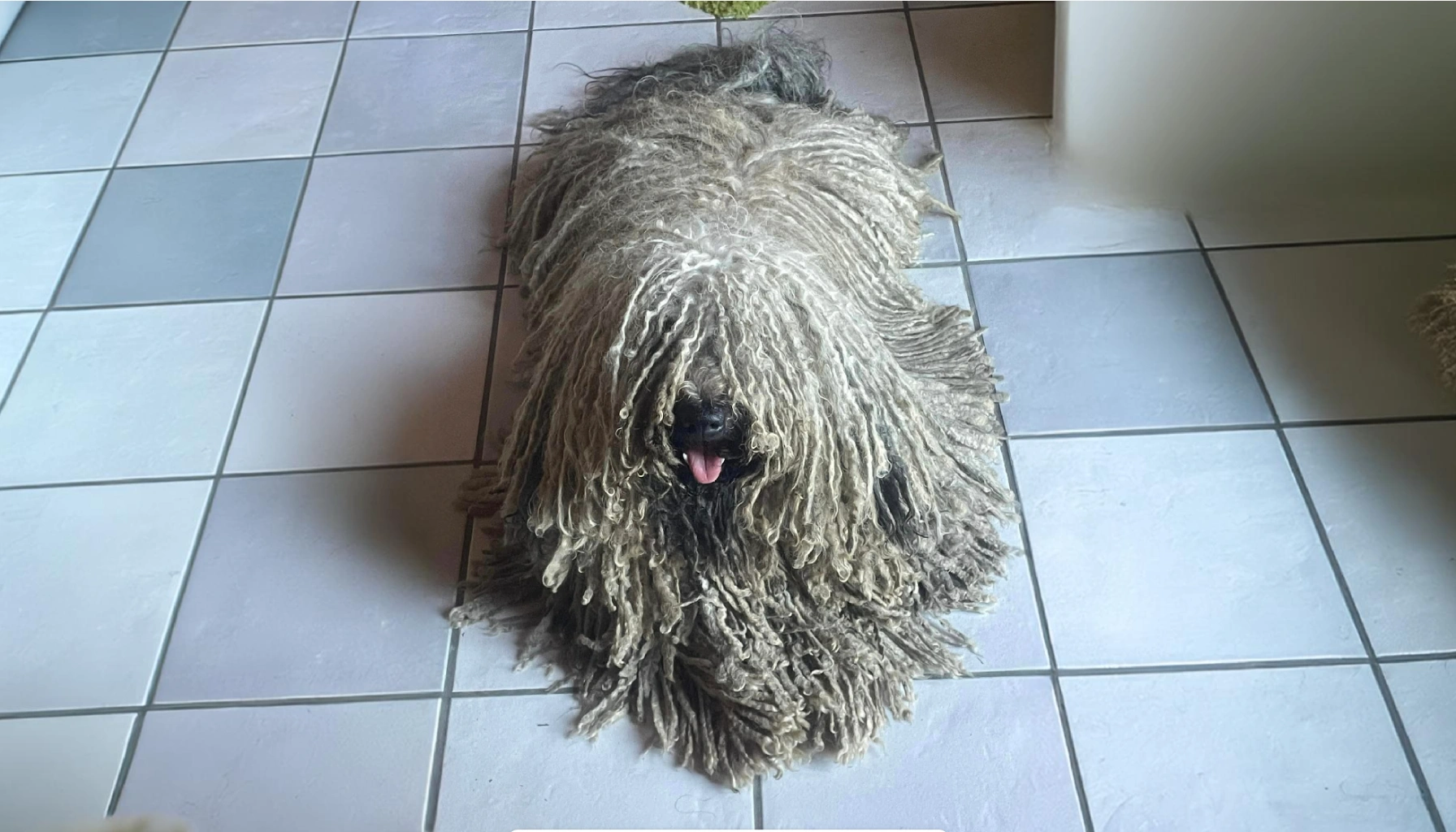Table of Contents
Hungarian Pumi Dog Breed
The Hungarian Pumi, often simply referred to as the Pumi, is a unique and versatile herding dog known for its lively personality, curly coat, and expressive ears. This medium-sized breed, with its roots in Hungary, is admired for its intelligence, agility, and strong work ethic. Whether you’re looking for a working dog, a loyal companion, or a lively addition to your family, the Hungarian Pumi is a breed worth considering. In this article, we’ll explore the history, characteristics, temperament, and care needs of the Pumi to help you understand why this breed is becoming increasingly popular among dog enthusiasts.
Hungarian Pumi Dog History and Origin
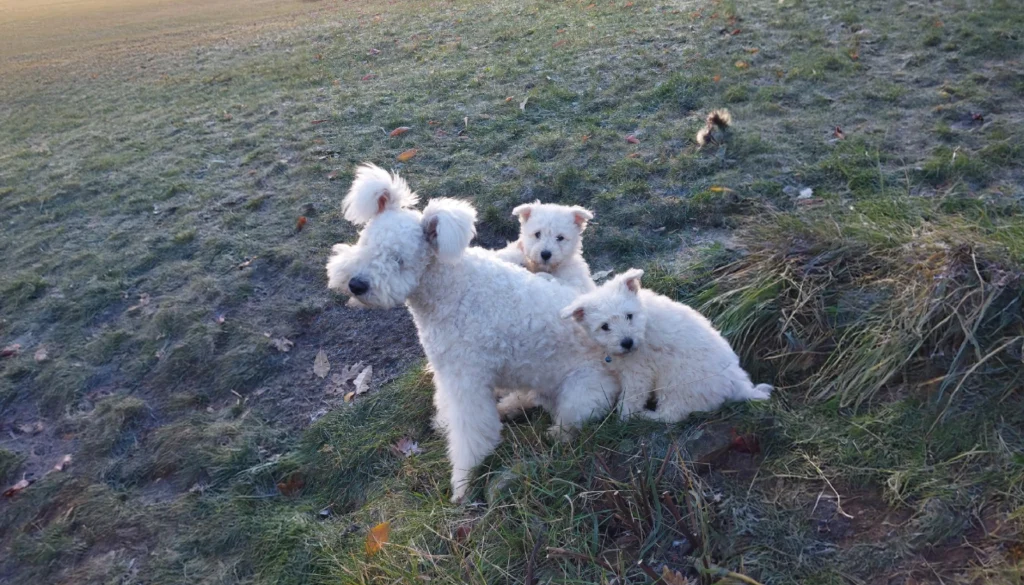
The Hungarian Pumi’s history dates back several centuries to rural Hungary, where it was bred as a versatile herding dog. The breed is believed to have emerged in the 17th and 18th centuries, a result of crossbreeding the Hungarian Puli with various European herding dogs, including German and French terriers. This blending of breeds gave the Pumi its distinctive look and exceptional herding abilities.
Originally, the Pumi was used to herd sheep, cattle, and swine across the challenging terrains of Hungary. Its keen intelligence, quick reflexes, and energetic nature made it an invaluable asset to Hungarian shepherds. Despite its strong herding instincts, the Pumi remained relatively unknown outside Hungary until the 20th century, when efforts to standardize and promote the breed began. Today, the Pumi is recognized by major kennel clubs worldwide, including the American Kennel Club (AKC), where it continues to gain popularity as both a working dog and a family pet.
Hungarian Pumi Dog Physical Characteristics

The Hungarian Pumi is a medium sized dog with a distinctive appearance that sets it apart from other herding breeds. Here are some of its key physical characteristics:
- Size: The Pumi typically stands between 15 to 18.5 inches (38 to 47 cm) at the shoulder and weighs between 22 to 29 pounds (10 to 13 kg), with males generally being slightly larger than females.
- Coat Type: The Pumi’s coat is one of its most recognizable features. It has a dense, curly, and wavy coat that is somewhat harsh to the touch. The coat is designed to protect the dog from the elements while working outdoors.
- Colors: Pumis come in a variety of colors, including black, white, gray, and fawn. The breed standard allows for a range of shades within these colors, but solid colors are most common.
- Distinctive Features: The Pumi’s ears are a standout feature, being semi-erect and highly expressive. The ears give the breed a lively and alert expression, which is complemented by its bright, inquisitive eyes.
Temperament and Personality
The Hungarian Pumi is known for its lively, intelligent, and spirited personality. These dogs are natural herders, which means they are highly energetic, alert, and quick-thinking. Pumis thrive on mental and physical stimulation, making them an excellent choice for active owners who can provide ample opportunities for exercise and play.
- Interaction with People: Pumis are loyal and affectionate with their families, often forming strong bonds with their owners. They are known to be somewhat reserved around strangers but will warm up once they become familiar with someone. This cautious nature makes them excellent watchdogs.
- Interaction with Children: Pumis generally do well with children, especially if they are raised with them. Their playful nature and high energy levels make them great playmates, although their herding instincts may lead them to try and “herd” younger children.
- Interaction with Other Animals: The Pumi’s herding background means they are usually good with other animals, particularly those they are introduced to from a young age. However, their herding instincts may kick in, so it’s important to supervise interactions with smaller pets.
Health and Lifespan
The Hungarian Pumi is generally a healthy breed with a lifespan of around 12 to 15 years. However, like all breeds, Pumis are prone to certain health issues. Some common health concerns for the breed include:
- Hip Dysplasia: A genetic condition where the hip joint doesn’t develop properly, leading to arthritis and pain.
- Patellar Luxation: A condition where the kneecap dislocates, which can cause discomfort and lameness.
- Progressive Retinal Atrophy (PRA): A group of genetic disorders that cause the retina to deteriorate over time, potentially leading to blindness.
To keep your Pumi healthy, it’s important to provide regular veterinary care, maintain a balanced diet, and ensure they get plenty of exercise. Regular check-ups and screenings for common genetic conditions can help catch and manage health issues early.
Care and Grooming
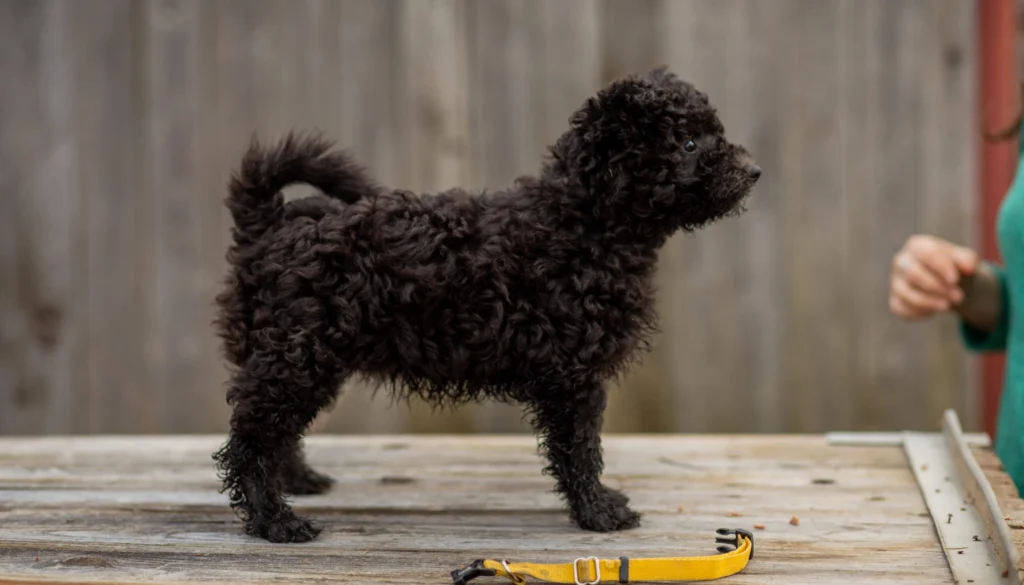
Caring for a Hungarian Pumi involves a commitment to regular grooming, exercise, and proper nutrition. Here are some essential care tips:
- Grooming Needs: The Pumi’s curly coat requires regular grooming to prevent matting and tangling. Brushing the coat several times a week is recommended, along with occasional trims to maintain its shape. Bathing should be done as needed, typically every few months.
- Exercise Requirements: Pumis are highly energetic dogs that need plenty of exercise to stay happy and healthy. Daily walks, playtime, and mental stimulation through training or puzzle toys are essential. Pumis excel in dog sports like agility, obedience, and herding trials.
- Dietary Recommendations: Feeding your Pumi a high quality, balanced diet is crucial for their overall health. The diet should be appropriate for their age, size, and activity level. Consult your veterinarian for specific dietary advice, including portion sizes and any supplements that might benefit your dog.
Training and Socialization
The Hungarian Pumi is an intelligent and eager to-please breed, which makes training relatively straightforward. However, their independent nature and high energy levels can pose some challenges for novice owners. Here are some tips for training and socializing your Pumi:
- Start Early: Begin training and socialization as early as possible. Puppy classes and exposure to various environments, people, and animals will help your Pumi develop into a well-rounded adult.
- Positive Reinforcement: Use positive reinforcement techniques, such as treats, praise, and play, to encourage good behavior. Pumis respond well to consistency and clear communication.
- Mental Stimulation: Keep training sessions engaging and varied to prevent boredom. Pumis excel in activities that challenge their minds, such as agility, obedience, and herding exercises.
- Addressing Challenges: The Pumi’s strong herding instincts can sometimes lead to behaviors like nipping or chasing. It’s important to address these behaviors early with proper training and redirection.
Suitability as a Family Pet
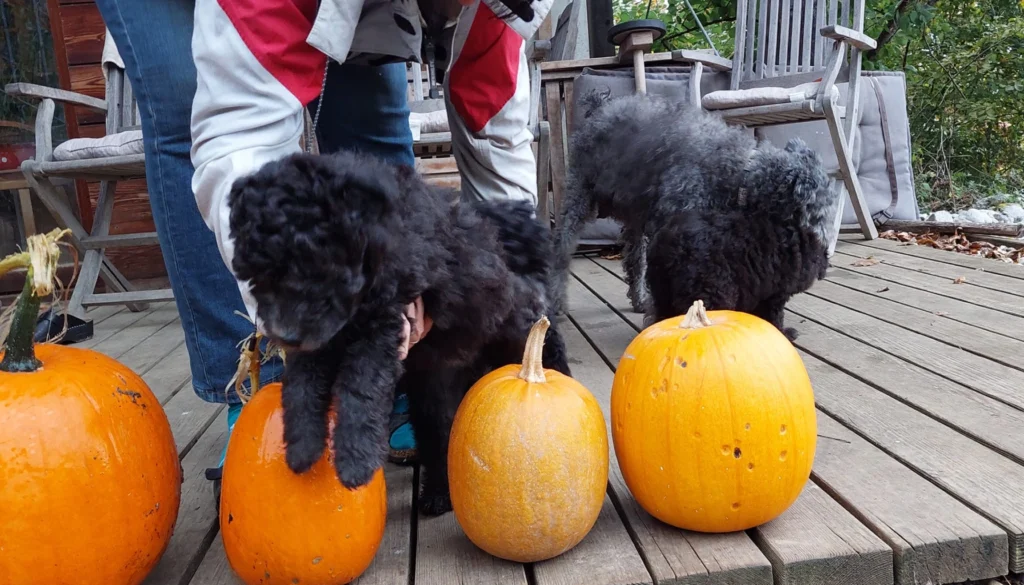
The Hungarian Pumi can be an excellent family pet for the right household. Their suitability depends on several factors:
- Living Environment: Pumis do well in homes with yards where they can run and play. They can adapt to apartment living if they receive sufficient exercise, but a more spacious environment is ideal.
- Energy Levels: This breed is best suited to active families who can provide plenty of physical and mental stimulation. Pumis enjoy outdoor activities like hiking, running, and playing fetch.
- Children and Other Pets: Pumis are generally good with children and can coexist peacefully with other pets if properly socialized. Their playful and affectionate nature makes them great companions for families.
Fun Facts and Trivia
- Vocal Breed: The Pumi is known for being quite vocal. They use a variety of barks, yips, and growls to communicate, making them excellent watchdogs.
- Rare Outside Hungary: Despite its growing popularity, the Pumi is still relatively rare outside Hungary. This breed is considered a national treasure in its homeland.
- Herding Skills: Pumis are incredibly agile and quick, capable of making sharp turns and fast movements to control livestock. Their herding style is more upright compared to other herding breeds like the Border Collie.
Dog Breeds Similar to the Hungarian Pumi
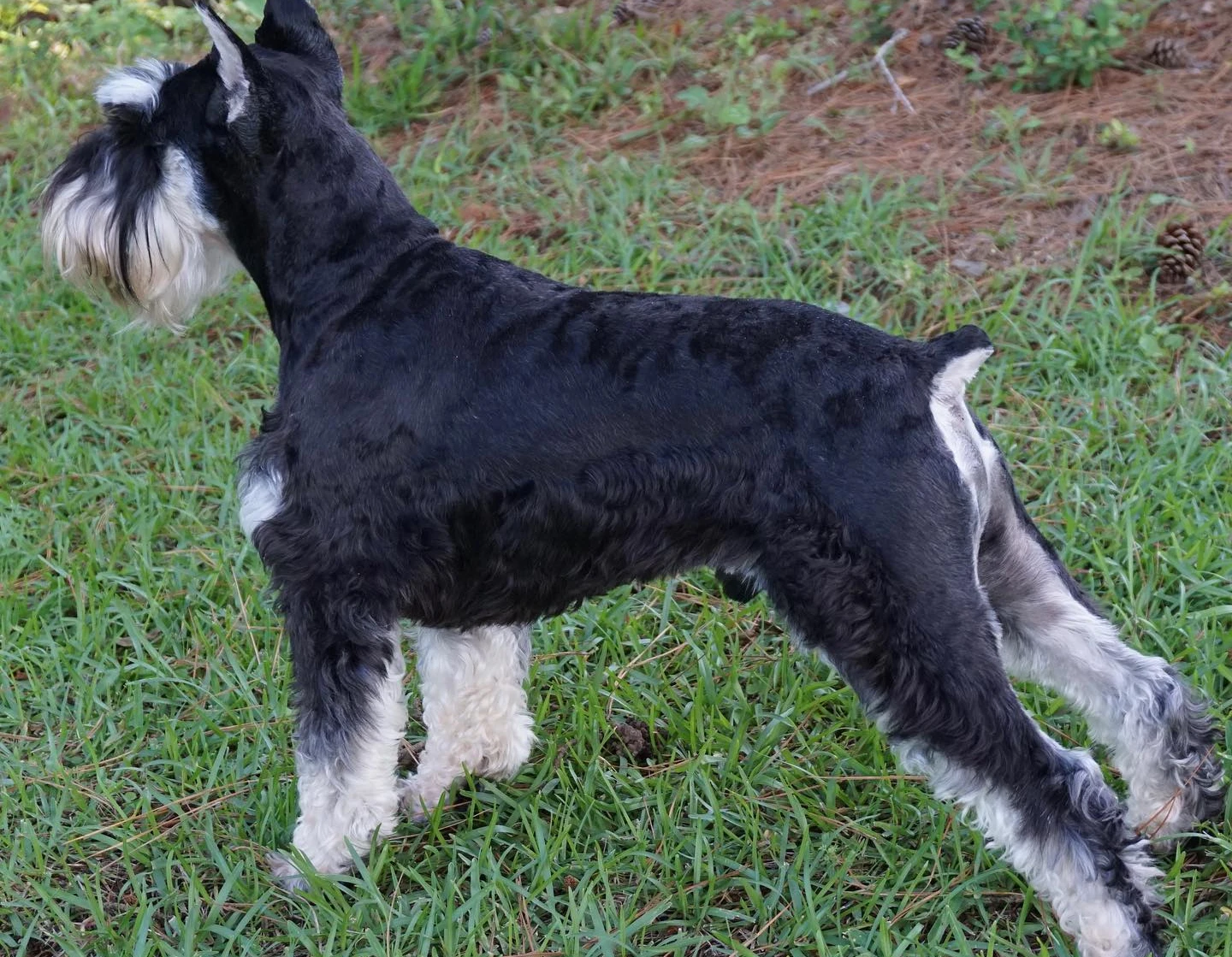
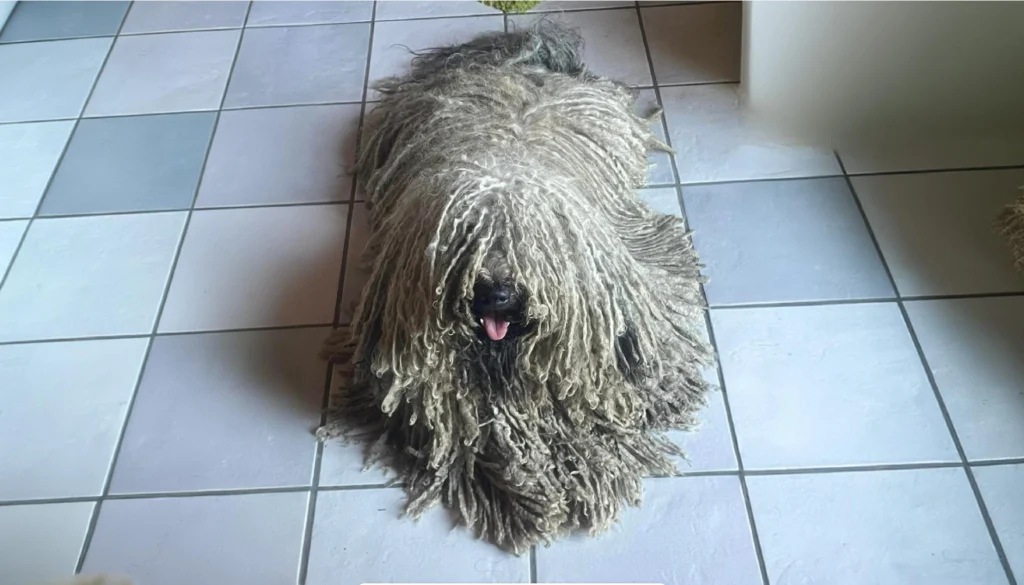

If you’re considering the Hungarian Pumi, you might also be interested in these similar breeds:
- Hungarian Puli: The Puli is another Hungarian herding breed known for its corded coat and strong work ethic. Like the Pumi, the Puli is intelligent and energetic, making it an excellent working dog and companion.
- Border Collie: Renowned for its intelligence and herding abilities, the Border Collie is a highly trainable breed with a strong desire to work. It shares the Pumi’s energy and drive but tends to have a more intense focus on tasks.
- Miniature Schnauzer: While not a herding breed, the Miniature Schnauzer shares the Pumi’s spirited and lively personality. This small but sturdy dog is known for its distinctive beard and keen sense of alertness.
Conclusion
The Hungarian Pumi is a lively, intelligent, and versatile breed that excels in both herding and as a family companion. With its unique appearance, energetic personality, and strong work ethic, the Pumi is a great choice for active families and individuals who can meet its exercise and mental stimulation needs. Whether you’re looking for a working dog or a loving pet, the Pumi offers a blend of loyalty, intelligence, and fun that few other breeds can match.
If you’re interested in learning more about the Hungarian Pumi or considering adding one to your family, be sure to research thoroughly and consider contacting reputable breeders or rescue organizations.
FAQs
Is the Hungarian Pumi a dangerous dog?
No, the Hungarian Pumi is not considered a dangerous dog. They are generally friendly, affectionate, and loyal to their families. However, like all dogs, they need proper training and socialization to ensure they are well behaved and comfortable around people and other animals.
Is the Hungarian Pumi the best guard dog to protect my family?
While the Hungarian Pumi is an excellent watchdog due to its alert nature and tendency to bark at unfamiliar situations, it may not be the best choice for a guard dog. Pumis are more likely to alert you to potential dangers rather than confront intruders directly. They are better suited for families looking for a lively, intelligent companion rather than a guard dog.



